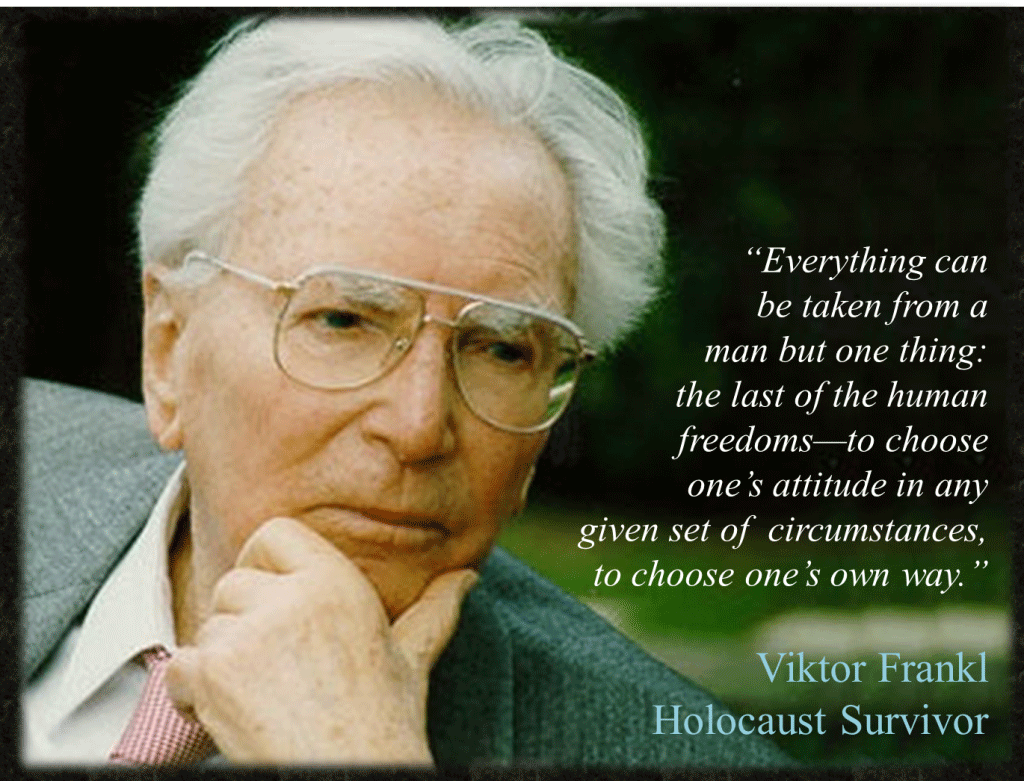Vicktor E. Frankl’s words bring to mind a traditional Buddhist story captured by Christina Feldman and Jack Kornfield.
“Buddha tells a parable about a man traveling across a field who encountered a tiger. He fled, the tiger after him. Coming to a precipice, he caught hold of the root of a wild vine and swung himself down over the edge. The tiger sniffed at him from above. Trembling, the man looked down to where, far below, another tiger was waiting to eat him. Only the vine sustained him.
Two mice, one white and one black, little by little started to gnaw away the vine. The man saw a luscious strawberry near him. Grasping the vine with one hand, he plucked the strawberry with the other. How sweet it tasted!”
This man, in dire circumstances, found something to enjoy and appreciate, just as neurologist and psychiatrist Viktor Frankl found meaning during his three years in concentration camps in Germany by believing in, loving and helping others.
Of course, I am not equating the beyond-the-pale suffering of those in concentration camps or the terror of a man hanging from a cliff to your experience in meetings. However, if it is true at Auschwitz or with tigers pursuing you, it is certainly true in our meetings: we can choose our attitude—an established way of thinking or feeling about someone or something—regardless of the circumstances.
What is your attitude towards meetings? Something you begrudgingly tolerate or that you hold as an opportunity to build relationships and get good work done? Your attitude is reflected in your behavior and influences the attitudes and behavior of others.
My attitude towards meetings is hopeful. I think that people’s time, energy, emotions and thoughts are precious resources to be tended and tapped. So, what do you do when you are in a meeting where people’s attitudes tend towards boredom, with occasional signs of nastiness, or, they don’t want to be there and think their resources are being wasted and drained?
If your attitude is begrudging tolerance, you will likely sit and wait for the meeting to end with an occasional complaint thrown in. However, if you believe that attitude is an important human freedom and you don’t want to waste your time and energy, you might choose to enliven a meeting with evocative questions and constructive contributions.
Evocative questions enliven meetings, especially those regular staff meetings that can get into ruts. Try starting each meeting with an engaging question: What do you most appreciate or enjoy about your work? What do you think our customers most appreciate about us? What is something you did that you are proud of? Are we talking about the most important things we should be talking about at our meetings?
Constructive contributions can take many forms. For instance, if the meeting is meandering, clarify what the group is trying to accomplish (I am getting a little lost. What is it we trying to get done in this discussion?) If the meeting is a series of project updates, check whether it is a good use of time: Although I appreciate hearing about everyone’s projects, I wonder if our time would be better spent identifying the points of conflict or coordination needed among our projects. We could get up to speed about the projects before the meeting via email.
Choose your own way to find or create meaning in your meetings. Find the sweet strawberry in the circumstance.

